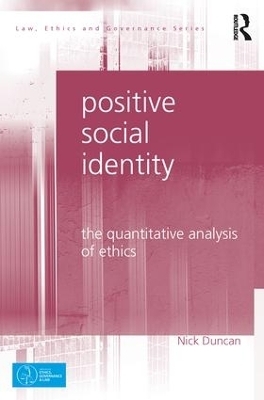
Positive Social Identity
Routledge (Verlag)
978-1-4724-8088-0 (ISBN)
This book argues that progress towards answering these questions is possible through a grounded analytical account of the cultivation of ethics and moral norms in social groups, in particular places and times.
Departing from the evolutionary theory of why we gain value from pro-social behaviour, we argue that a coherent thread exists for how we do so through evolved social capacities that are united in the pursuit of a Positive Social Identity.
Drawing on a unique quantitative dataset from Sierra Leone this book offers a theoretical framework and a preliminary guide to the systematic quantitative analysis of ethics and moral norms and how these may relate to the long term success of organisations.
The results directly challenge a ‘one-size-fits-all’, universal understanding of both ethics and moral norms both within and between organisations. The costs and challenges influencing the development of ethics and moral norms and their ultimate conception of pro-sociality vary dramatically according to situation. Nowhere is this more starkly illustrated than between economically developed and developing countries.
In analysing the relationship between agency and situation, the role of diversity, conflict, inefficiency and failure to cooperate prove to be essential components of the solution of social dilemmas on which Positive Social Identity depends.
Dr Nick Duncan has directed both commercial and NGO organisations with activities in over 20 countries. Nick has specialised over the last 15 years in corruption, anti-corruption and organisational ethics. During this period, he has specifically focussed on issues of measurement, both as a practitioner and researcher. He has published, and lectured internationally on these subjects. Nick is currently lead consultant at Strategic Organisational Ethics in Cambridge UK.
Introduction
Chapter 1: Evolutionary Motivations Towards Pro-Social Moral Norms
Chapter 2 The Social Brain and Moral Self-Identity
Chapter 3 Situation and Transformation in the Resolution of Social Dilemmas
Chapter 4 Intrapersonal Identity Positivity
Chapter 5 Positive Social Identity
Chapter 6: A Situational Model of Positive Social Identity
Chapter 7: A Situational Analysis of Positive Social Identity
Chapter 8: Conclusion: The Distinct Importance of Positive Social Identity
Bibliography
Appendix 1: Data Collected
Appendix 2: Correlation between Indicators of PSID Pro-social Behviour and Social Resources
Appendix 3: Equations Used for Graph Level Indicators
Index
| Erscheinungsdatum | 12.07.2017 |
|---|---|
| Reihe/Serie | Law, Ethics and Governance |
| Zusatzinfo | 28 Tables, black and white |
| Verlagsort | London |
| Sprache | englisch |
| Maße | 156 x 234 mm |
| Gewicht | 612 g |
| Themenwelt | Geisteswissenschaften ► Philosophie ► Ethik |
| Naturwissenschaften ► Geowissenschaften ► Geografie / Kartografie | |
| Recht / Steuern ► Allgemeines / Lexika | |
| Recht / Steuern ► EU / Internationales Recht | |
| Sozialwissenschaften ► Soziologie | |
| Wirtschaft ► Betriebswirtschaft / Management ► Marketing / Vertrieb | |
| ISBN-10 | 1-4724-8088-0 / 1472480880 |
| ISBN-13 | 978-1-4724-8088-0 / 9781472480880 |
| Zustand | Neuware |
| Haben Sie eine Frage zum Produkt? |
aus dem Bereich


